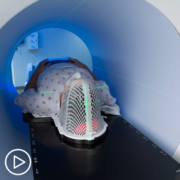Head and Neck Cancer Research | How Innovation Leads to Advances in Care
Head and Neck Cancer Research | How Innovation Leads to Advances in Care from Patient Empowerment Network on Vimeo.
How can innovation lead to head and neck cancer research advances? Expert Dr. Ezra Cohen discusses how improvements in technology have led to changes in diagnostics, therapeutics, surgery, and radiation.
See More from Evolve Head & Neck Cancer
Related Resources:

Head and Neck Cancer Care | The Benefits of Partnering With Your Healthcare Team |

Head and Neck Cancer | Key Factors Affecting Treatment Decisions |

|
Transcript:
Katherine:
How are innovations in technologies accelerating head and neck cancer research?
Dr. Cohen:
I think, in many ways. First there’s – we mentioned the multidisciplinary approach of head and neck cancer and each of the disciplines, the major therapeutic disciplines, being medical oncology, radiation and surgery, really have had dramatic technological advances in the last, certainly in the last decade, maybe a little bit longer.
For the surgery, it’s been the ability to do minimally invasive surgery, usually through a robot called transoral resection. And this is, as the name implies, literally a robot that’s controlled at the side of the operating room or even sometimes controlled remotely. But the advantage is that the instrument is much smaller than the human hand, and it can articulate in every degree possible. Which, obviously, the human hand has restrictions.
So, in other words, that robot can get into places and get into areas that would be very difficult without a much bigger surgery if done without the robot. And now, that surgery called TORS, transoral robotic surgery, has become pretty well, pretty standard for cancers of the base of the tongue and the oral pharynx.
That is really the back of the throat. Whereas in the past, in order to access those areas, the patient’s jaw would have to have been split, and the area had been opened. Now, that’s not necessary at all, and the surgery has turned into a much, much faster recovery with equivalent oncologic outcomes. And, of course, there’s more advancements going on in that regard.
For radiation, I think the most relevant technological advances have been the ability to focus radiation through different means on the tumor and spare normal tissue. Whether that’s with something called IMRT, which is essentially a much more sophisticated way to deliver radiation that is controlled by a computer that allows the radiation fields to be contoured around structures in a 3D fashion, much more than we were able to do prior to that.
And, of course, the other way is to use a different type of energy. Whereas conventional radiation, when we talk about radiation, we’re talking about photons. Protons, now, are becoming more widely available. And that particle has a different way to deliver energy and can actually spare normal tissue but still deliver the energy desired to the tumor. So, tremendous advances in radiation.
And then, of course, for medical oncologists, we’ve had advancements in both diagnostics and in therapeutics. 10 years ago, sequencing a cancer, deciphering the genes that drive it, the mutations that drive it, was uncommon. And, in fact, even I dare say, frowned upon by the community.
But now, there isn’t a patient that I see who has recurrent or metastatic disease that I don’t sequence. I sequence them all.
Katherine:
Wow.
Dr. Cohen:
Because the technology is readily available and quite honestly, it gives us more information that we might be able to apply to the treatment of that patient. So, that’s been a very large, a very big advancement. And then, of course, therapeutically we’ve had different agents that we’ve been able to look at. I mentioned immunotherapy. There are many new drugs that are being tested and hopefully very soon even approved for patients with head and neck cancer.












